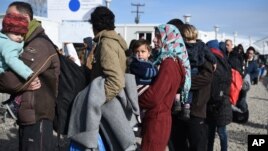15 March, 2016
For the refugees living in a camp along the border of Greece and Macedonia, each day begins with hope.
The refugees hope that the Macedonians will open the border. They hope that it won't rain. They hope that they have enough food.
Hope is what brings between 500 and 1,000 new refugees to the area every day.
Provisional agreement
The refugees' hopes were high last week. The refugees said they believed a meeting between the European Union and Turkish leaders would bring good news.

Refugees wait in line for their documents to be checked by the Greek police before they cross the borderline to Macedonia near the northern Greek village of Idomeni, on Sunday, Feb. 21, 2016. Macedonia has closed its southern border with Greece to Afghan migrants, allowing only Iraqis and Syrians, Greek police report. (AP Photo/Giannis Papanikos)
Few of the nearly 16,000 refugees living in the camp understand that the EU and Turkey have reached a limited agreement. The EU will take one Syrian refugee from Turkey for each Syrian refugee that Turkey takes from Greece.
EU leaders will meet soon to discuss the plan. The plan has angered UN refugee chiefs and human rights groups. The UN's refugee agency said a blanket return may violate international law.
Possibility of resistance
If EU and Turkish officials go forward with the plan, it could spark anger in the camp. The few refugees who understand the plans say they will resist.
One refugee, a 32-year-old father of two children, said, "There's war in Syria; there will be war here. I didn't risk the journey here – a sea crossing with my wife and kids – to be taken back."
High tensions
Tensions are high in the camp. Many children are sick. The children's parents are angry about how few doctors are in the camp.
"We queue for hours to see anyone," said a woman from Syria. She has three young children. The youngest, age 2, has been sick for days.
In the last few weeks, fights have broken out while refugees wait for food.
A French medical charity called Doctors Without Borders has given food to refugees. But it is difficult serving everyone in the camp. The charity asks other organizations to help.
A local Greek charity called Praxis works in the camp, but does not have enough employees.
A Praxis worker said: "What is happening here is disgracing Europe – it is shaming Europe."
UNHCR, the United Nations' refugee agency, has a small presence in the camp. One worker for Doctors Without Borders said UNHCR representatives spend most of their time talking with the press.
The police presence grows
The number of police in the camp has increased. One policeman said he worries that the refugees will become violent when they learn they are not going to the EU.
"We don't want a repeat of what happened the other day," he said. He was referring to the February 29th clash between refugees and Macedonian border guards.
Refugees shook the fence blocking their way. Guards shot rubber bullets and tear gas to keep them back.
Last Wednesday refugees and locals complained that police told them to stop selling food.
A Syrian refugee from Aleppo, who has been selling soft drinks, said, "I think they want to make the refugees even more uncomfortable, to pressure them so when the time comes to move them away, they might not resist."
I'm Kathleen Struck.
Jamie Dettmer reported on this story for VOANews. John Russell adapted his report for Learning English. Kathleen Struck was the editor.
________________________________________________________________
Words in This Story
blanket – adj. affecting everyone or everything
spark – v. to cause (something) to start or happen; to incite or fuel
complain – v. to say or write that you are unhappy or sick, or to state that you do not like something
uncomfortable – adj. causing a feeling of physical unease
We want to hear from you. Write to us in the Comments Section.